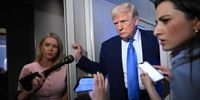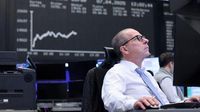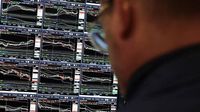On Monday, April 7, 2025, global stock markets plunged dramatically, reflecting widespread panic following the announcement of increased tariffs by U.S. President Donald Trump. The New York Stock Exchange opened with significant losses, as the Dow Jones Industrial Average fell by 2.85% and the Nasdaq Composite Index dropped by 3.91%. This downturn was echoed across European markets, with the Frankfurt Stock Exchange plummeting by 7.9% in early trading, briefly showing losses of over 10%. The Paris Stock Exchange fell by 6.19%, London by 5.83%, and the Swiss Stock Exchange by 6.8%. Asian markets were similarly affected, with Tokyo's Nikkei index closing down 7.8% and Hong Kong experiencing a staggering 13.2% drop, marking its worst session since the Asian financial crisis of 1997.
The chaos in the markets was triggered by Trump's recent decision to impose a minimum tariff of 10% on nearly all imports to the United States, with additional targeted surtaxes for countries deemed particularly hostile in trade. The European Union is set to face a 20% tax, while Chinese products will incur a hefty 34% tariff starting April 9, 2025, on top of the existing 20% already imposed by Washington. This aggressive trade policy has sent shockwaves through the global economy, raising fears of a recession and a potential historic market crash.
Market analysts are expressing deep concern over the implications of this trade war. Alexandre Baradez, a market analyst at IG, stated, "There is stress affecting the markets, leading to violent movements. No one knows what to expect: companies can't make investment forecasts, and consumers are unsure whether to spend, causing a contraction." Christian Saint-Etienne, an economist at the Conservatoire national des arts et métiers, added that Trump's trade war would significantly reduce profits for industrial companies listed on global exchanges.
As stock prices fell, shares of major companies such as ArcelorMittal, Airbus, and Safran also took a hit, losing 5.7%, 7.5%, and 9.8% of their value respectively shortly after the Paris market opened. This downturn is not just a local issue; it reflects a broader fear of a slowdown in global economic growth. Saint-Etienne warned, "If no agreement is reached and the new tariffs are applied, global growth, which has been around 3% for the past two years, could lose a point." He characterized the market's reaction as a difficult and unpleasant adjustment.
The economic fallout from these tariffs is being described as the most significant shock to the global trading system since the collapse of the Bretton Woods agreement in 1971. Economists at Deutsche Bank referred to the market movements as "historic," indicating the severity of the situation. Baradez pointed out that the current market behavior fits the definition of a crash: "When the market loses 5% one day, then 5% the next, that is the definition of a crash. There is extreme speed in the movement, and no pause in the decline, but that does not mean we will see an 80% drop." In just a few days, over 1,500 billion euros in market capitalization disappeared in Europe, and losses in New York reached approximately 6,000 billion dollars after the sessions on Thursday and Friday.
Looking ahead, Baradez suggested that the fall in markets could stabilize if the United States and other countries negotiate to halt this trade war or if the Federal Reserve lowers interest rates to cushion the blow and reassure investors. Meanwhile, the Trump administration announced on Sunday that over 50 countries had reached out to the White House to negotiate the tariffs imposed by Washington. However, Trump appeared unfazed by the market turmoil, comparing the stock market panic to "a treatment" necessary to heal the ills of the American economy.
In response to the escalating trade tensions, the European Union is seeking to present a united front. Ursula von der Leyen, President of the European Commission, stated that the EU has proposed a total and reciprocal exemption from tariffs on industrial goods to the U.S. However, there is a divergence of opinions among EU member states regarding potential retaliatory measures. Some countries advocate for targeting American technology giants such as Microsoft, Amazon, Google, and Meta (Facebook), while others caution against escalating the situation further.
French and German officials have called for a strong response from Brussels, emphasizing that no options should be off the table regarding American goods and services. Laurent Saint-Martin, the French Minister for Foreign Trade, highlighted the need for the EU to utilize its "extremely aggressive" trade tools if negotiations fail. Meanwhile, some European diplomats express skepticism about the likelihood of a successful negotiated solution with the unpredictable Trump administration.
As the situation unfolds, the economic implications of Trump's tariffs are becoming increasingly clear. JPMorgan Chase has warned that the extensive customs duties will likely slow U.S. economic growth, with potential impacts on inflation and employment. The markets are bracing for a turbulent period as investors attempt to gauge the full extent of the fallout from these trade policies.
In the wake of this crisis, countries around the world are preparing their responses. The Canadian government has already taken steps by filing a complaint with the World Trade Organization regarding the tariffs on vehicles and automotive parts. Meanwhile, countries like Japan are seeking to negotiate with the U.S. to alleviate the impact of these tariffs on their economies. The global response to this trade war is still in its early stages, but the potential consequences could reshape international trade relations for years to come.
As the world watches closely, the question remains: will this trade war escalate further, or can diplomatic negotiations bring about a resolution? In the meantime, the markets remain on edge, reflecting the uncertainty that accompanies such unprecedented economic measures.







